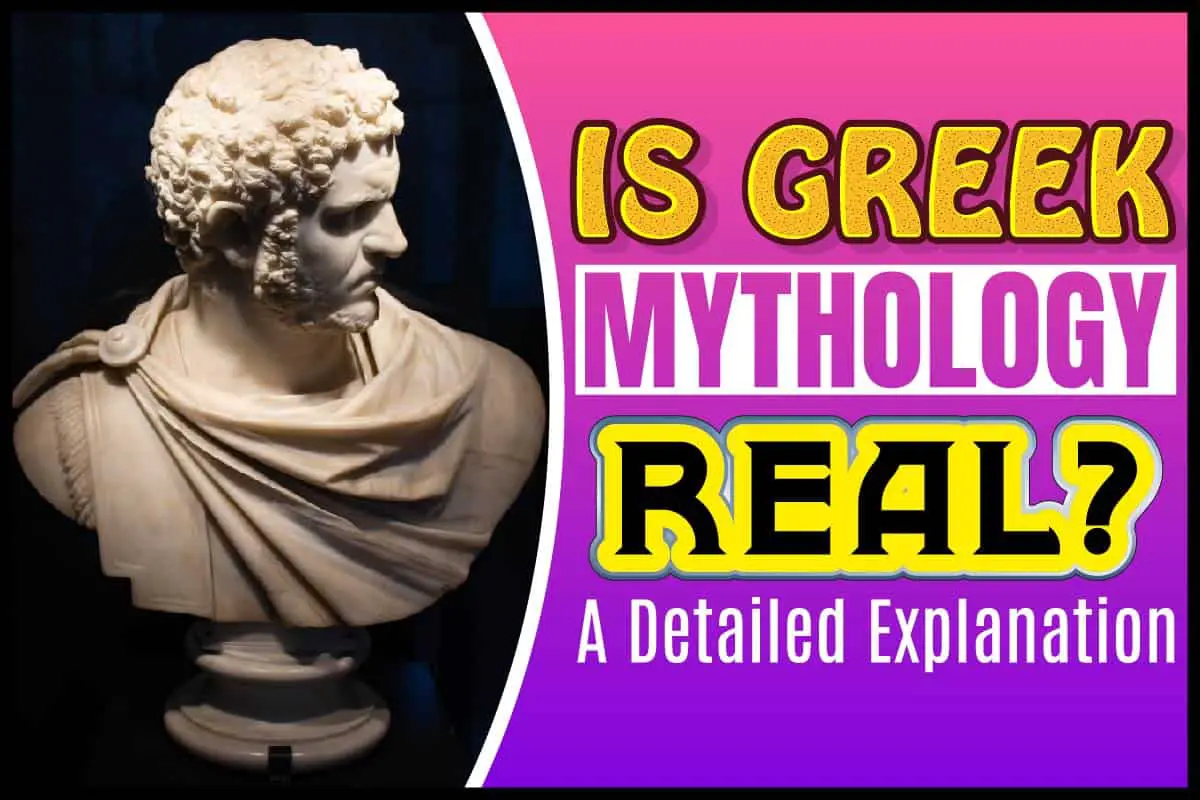Greek mythology is a set of stories about Greek gods, goddesses, rituals, and heroes of ancient Greek. It has played a massive role in history, art, literature, culture, and different aspects of life.
The influence of Greek mythology in literature remains unrivaled. With its visible impact in literature comes the prodding on whether it is real or fictional. Now, before
So, let’s answer the question.
Is Greek mythology real?
Yes and No. Now, let’s explain further. The popular piety of Greek regarded the myths as real accounts even though they contained elements of fiction. Because of this firmly held belief, many historians opine that although parts of Greek mythology may be fictional, their role in history is real.
So, it is real to many people and mere fiction to others. Whatever your views on Greek mythology are, it is impossible to ignore its role in different aspects of life.
This post contains more on the topic. Read on:
Sources Of Greek Mythology
Almost all we know about Greek mythology comes mainly from Greek literature. Literature has played a dominant role in passing on the knowledge of Greek myths from generation to generation.
Mythical representations exist, although they are not as popular as Greek literature. This representation date is as far back as the geometric period. It was first on visual media.
The two primary sources of Greek mythology are Literary and Archeological sources.
Literary Sources:
People’s understanding of Greek traditions comes from the texts that survived the classical period. The two most popular and oldest texts from this period are Iliad and the Odyssey by Homer.
The two literary sources are known as Homer’s epic poems. They focus on the events that happened around the time of the Trojan War. When people talk about the source of their Greek knowledge, it is more often than not from the two epic poems.
The two accounts of the Iliad and Odyssey show a picture of the Greek’s hunger for fantastic tales. It also shows the Greeks’ understanding of the Complexities in the relationship between gods and humans.
As popular as they are, they are not the only literary sources. There were also poems by Hesiod, Homer’s contemporary. Hesiod has two poems that belong to Greek literary sources; Theogony and the work and Days.
Hesiod’s poems contain a record of the beginning of the world. They also include the history of sacrificial practices, the coming of divine rulers, the human age, and the history of human woes.
In Theogony, Hesiod focuses on the origin of the gods. You would find a complete account of the earliest Greek myths in the poem. Also, etiological tales, folktales, a history of creation, descriptions of the gods, giants, and titans were not left out.
Works and Days is an instructive poem about farming life, the myths of Pandora, Prometheus, and the Four ages. In this poem, Hesiod offers suggestions on the best way to live and progress in a dangerous world made worse by its gods.
The literary sources didn’t stop at Homer and Hesiod. There were also academic Poets. These Poets composed Homeric hymns that focused on myths. They initially handled and delivered tales in narrative forms but later changed to a more allusive style.
These poets preserved myths in lyric poems, scholars’ writings, and the tragedians of the 5th century. The lyrical Poets of that time include Bacchylides, Pindar, and the Bucolic Poets who came later. They gave individual explanations and images of mythological happenings.
Also, the classical Athenian drama took its source from myths, showing that literary sources didn’t stop at poetry and hymns. Tragic Playwrights like Euripides got their plot inspirations from the Trojan War.
Some of the greatest tragic stories came to life in classic forms by these plays: Oedipus, Agamemnon, and his children. So, tragic playwrights aren’t the only ones that used myths. Comic playwrights used myths to entertain and to critique the Greek’s.
Historians and geographers also played significant roles in recording Greek history and traditions. They journeyed around Greek territories, taking records of what they heard and saw and providing numerous myths from their encounters.
Lastly, the Roman and the Hellenistic Age in literary form contains details that would have been lost if it wasn’t in literary form.
Archeological sources:
In addition to literary sources, archeological sources have contributed to understanding Greek myths. As concrete as the literary sources were, archeology has helped explain some of them.
For example, two significant archaeological discoveries have assisted in explaining parts of Homer’s epic poems. Works from the period, such as the 19th and 20th centuries by Heinrich Schliemann and Sir Arthur Evans, respectively, explain confusing details of Homer’s epic poems.
They have also given solid backings to claims about Greek myth and life. These visual representations of different mythical figures found in Archeological sites have great importance.
Firstly, the visual representations may preserve myths or mythical events/scenes not recorded in literary sources. For example, archaeologists have discovered pottery from the Trojan war and Heracles adventures that no one can link to any of the records in literary sources.
Another reason why archaeology is important is that it gives students a chance to predate myths accurately. Many times these visual representations predate a scene’s first recorded appearance in history.
Archaeology is the perfect backing for the different literary sources.
The Deities Of The Greek Pantheon
In ancient Greek, the twelve gods that live on mount Olympus (Olympians) are the deities of the Greek Pantheon. They are
Zeus:
Zeus is the king and ruler of the other gods and Mount Olympus. He is the god of lightning, thunder, and the sky, the god of justice, law, and order. Thunderbolt, a scepter, a bull, scales, an eagle, or an oak tree are symbols used to represent him.
He had affairs with both mortals and goddesses. The people mostly mentioned are his sister Demeter, mortal Alcmene, etc. His parents were Titans Rhea and Cronus. He was the youngest of his siblings, Hades, Hestia, Demeter, and Poseidon, Hera (his wife)
Hera:
Hera is the queen of the gods, the goddess of family, marriage, childbirth, and women. She is the wife and sister of the god Zeus, the youngest daughter of Titan Rhea and Cronus. Her symbols of representation include a peacock, cows, or a cuckoo.
Poseidon:
Poseidon is well-known as the god of the seas, earthquakes, storms, water, horses, and hurricanes. Like many Greek gods, he had a wife and many lovers. His parents were the Titans Rhea and Cronus. His symbols of representation include a horse, a trident, a dolphin, or a bull.
Demeter:
Demeter is the goddess of harvest, seasons, nature, and agriculture. She is the eyes watching over the earth’s fertility. Poseidon and Zeus, her brothers, were her lovers as well. She had three children, Arion, Despoina, and Persephone.
A poppy, a cornucopia, wheat, a torch, or pigs are symbols that people use to represent her.
Athena:
Athena is well-known as the goddess of wisdom, warfare, and handicraft. She is Zeus’s daughter with Oceanid Metis. Athena didn’t have the traditional conception other children had.
She came into the world from Zeus’s head fully developed and wearing her armor. Her symbols are the olive tree and owl.
Apollo:
Apollo is the god of light, the sun, archery, prophecy, manly beauty, healing, medicine, truth, inspiration, poetry, and arts. He is the son of Zeus and Leto. He is also the twin brother to the goddess Artemis.
His symbols of representation include the sun, a swan, a mouse, or a lyre.
Artemis:
Artemis is the goddess of the hunt, virginity, the moon, wilderness, archery, plague, childbirth, and protection.
She is the twin sister to the god Apollo. Her representation symbols include the moon, a snake, a bow and arrow, the cypress tree, a hound, or a deer.
Ares:
Ares is the god of war. He is also the god of manly virtue, bloodshed, and violence. The word Martial came from his Latin name Mars. The other gods hate him except Aphrodite.
Ares is also known as the son of Zeus and Hera. His representation symbols include a Boar, a dog, a serpent, a shield, a vulture, or a spear.
Aphrodite:
Aphrodite is well-recognized in Greek Mythology as the goddess of love, desire, fertility, pleasure, beauty, procreation, and passion. There are different accounts of her birth, but she is most recognized as the daughter of Zeus.
Hephaestus is her husband, although she had many lovers. Ares was one of her many lovers.
Hephaestus:
Hephaestus is the god of the forge, volcanoes, craftsmanship, and fire. He is the craftsman and blacksmith of the gods—the son of Hera and the husband of Aphrodite. The word Volcano came from his Latin name Vulcan.
His representation symbols include fire, an ax, a donkey, quails, tongs, or an anvil.
Hermes:
Hermes is also recognized as the god of travel, borders, communication, thieves, diplomacy, commerce, eloquence, and games. He is the god’s messenger, the map for dead souls, and the second-youngest Olympian.
He is Zeus and Maia’s son. His symbols of representation include caduceus, stork, a tortoise, or winged sandals.
Bacchus/Dionysus:
Bacchus is the youngest olympian god. He is the god of wine, ecstasy, grapevines, madness, and festivity. Also, the son of Zeus and a mortal woman called Princess Semele. He is the patron god of the arts.
Bacchus is the only god whose mother is a mortal. He is married to princess Ariadne.
His symbols include grapevines, cups, leopard, pinecone, tiger, dolphin, ivy, and goat.
Conclusion
Greek mythology may not be entirely real but what it represents is completely real. It is a representation of some people’s lives and beliefs.
Many generations have formed their religion, lives, and worldview from Greek mythology. The different sources and accounts stand for more than just fiction and movies.
This post is an overview of Greek mythology and its many sources.
 Being Human
Being Human




